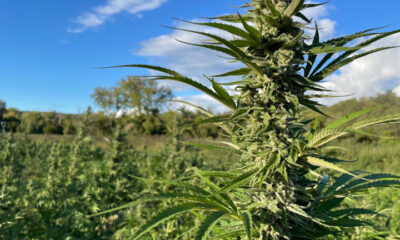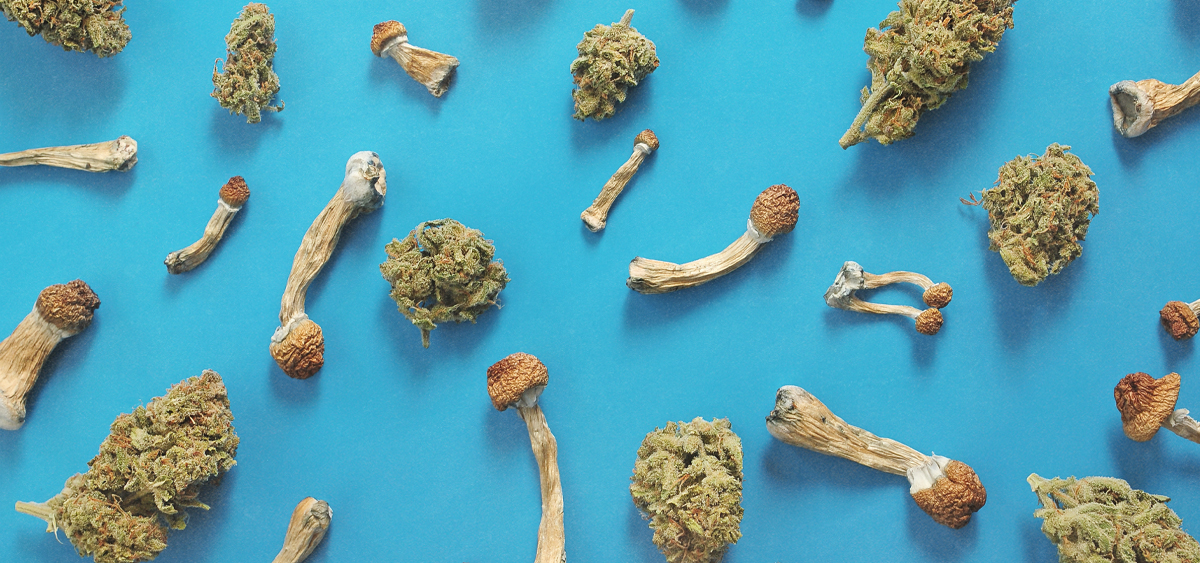featured
New Survey: 9 in 10 Americans Want Decontaminated Cannabis
Published
1 day agoon

[PRESS RELEASE] – LAS VEGAS, July 24, 2025 – A recent nationwide survey underscores a compelling truth in the cannabis industry: While there is significant support for the decontamination of cannabis to eliminate harmful pathogens such as mold and bacteria, most individuals are still unaware of how this is achieved and the various technologies behind it.
According to a survey of over 500 Americans, commissioned by XRPure, an overwhelming 91.7% of respondents believe medical cannabis should be decontaminated. Similarly, 90.5% agree that cannabis brands should be required to label their packaging if the product has been decontaminated. Yet, when it comes to understanding the available methods—X-ray, ozone, and radiofrequency (RF) technologies—only 1 in 4 respondents (26.4%) said they were confident in their knowledge.
“This survey reflects a major gap in awareness of how we can make cannabis cleaner and safer to consume,” said Jeff Adams, founder and Managing Director of XRPure, a company propelling innovation in cannabis decontamination using X-ray energy. “Consumers are clearly demanding transparency and safety in their cannabis products, but we as an industry need to do a better job in fully communicating how those safety standards are met.”
Additional findings include:
- 53.7% said they would be more likely to purchase decontaminated cannabis flower
- Only 15.7% would be less likely to do so.
- 43.8% of respondents admitted they do not understand the differences between the main decontamination methods used today
The survey, which included adult participants across diverse age groups, income brackets, and U.S. regions, confirms that decontamination is no longer a niche concern—it’s a mainstream expectation. It also signals an important opportunity for cannabis brands and regulatory agencies to prioritize publicizing that the flower has been decontaminated, the method that was used to do so, and why this is significant.
“This all starts with labeling, but we need to strive to go beyond that,” Adams said. “If we’re going to foster trust in the cannabis industry and ensure product safety, we must also invest in educating consumers about what decontamination is, why it matters, and how it’s done.”
Unlike traditional chemical or heat-based decontamination methods, XRPure’s proprietary machines use X-ray technology to fully penetrate the cannabis flower, breaking down microbial DNA and rendering them inert. X-rays pass through the plant and leave no trace residue, so the plant can retain its full integrity. By using a cold process that doesn’t affect the chemical properties of the plant, cultivators can now treat their flower post-harvest, before or after packaging, to achieve dramatic—if not total—microbial reduction. This approach crucially boosts the safety of products for both adult-use consumers and medical patients, while helping cultivators reduce costs associated with crop loss and product recalls.
As cannabis legalization expands and product offerings diversify, setting clear standards for safety and transparency is vital. This survey serves as a call to action for producers, lawmakers, and educators alike to bridge the knowledge gap and meet the rising demand for cannabis that not only meets minimum safety standards but is decontaminated to exceed safety standards.
The full survey can be viewed here. For more information about XRPure’s decontamination systems or to request a demo, visit www.xrpure.com.
Survey Methodology:
XRPure commissioned SurveyMonkey to conduct a survey of 500 anonymous Americans ages 18 and up. The survey was conducted in May 2025.

Author: mscannabiz.com
MScannaBIZ for all you Mississippi Cannabis News and Information.
You may like
-


Cannabis & Psychedelics Reported Most Effective Non-Prescription Drugs by Eating Disorder Patients
-


Kentucky Governor Urges Trump To Oppose Bill Blocking Marijuana Rescheduling That’s Advancing In Congress
-


New York cannabis board approves 52 new licenses, pushes total to 1,851
-


South Park Loves Marijuana – The Fresh Toast
-


Lo Más Reciente de High Times en Español
-


DEA Judge Overseeing Cannabis Rescheduling Process Retires
featured
Cannabis & Psychedelics Reported Most Effective Non-Prescription Drugs by Eating Disorder Patients
Published
22 minutes agoon
July 25, 2025
An international survey of thousands of eating disorder patients found that respondents rated cannabis and psychedelics, including psilocybin and LSD, as the most effective non-prescription drugs for treating their symptoms.
The survey, conducted by University of Sydney researchers and published in JAMA Network Open, found that typical prescription drugs like antidepressants were not well-regarded by respondents. Additionally, respondents said the worst non-prescribed substances for treating their symptoms included alcohol, nicotine, and cocaine, although they are still widely used.
“Our results provide important insights into the lived experiences of people with eating disorders and their drug use, highlighting promising avenues for future research into treatments,” the lead researcher, Sarah-Catherine Rodan, a PhD student at the University of Sydney’s Lambert Initiative for Cannabinoid Therapeutics, said in a press release.
“This research suggests that cannabis and psychedelics hold significant promise for improving quality of life in individuals suffering eating disorders. This is particularly salient since current pharmacological options for these patients are severely limited and current treatment outcomes so disappointing. Of course, rigorous clinical trials are needed to confirm these benefits and better determine safety profiles.” — Professor Iain McGregor, the paper’s senior author and Academic Director of the Lambert Initiative, in a statement
The survey targeted 7,600 individuals across 83 countries. About two-thirds of the respondents were formally diagnosed with an eating disorder; the others “self-reported an eating disorder that caused distress.” Additionally, all major eating disorders were represented in the study, the researchers said, including anorexia nervosa (40%), bulimia nervosa (19%), binge-eating disorder (11%), and avoidant restrictive food intake disorder (ARFID) (9%).
“I hope this study gives a voice to people living with eating disorders, revealing that their often-stigmatised experiences with drugs might in fact have therapeutic potential,” Rodan said.

Author: mscannabiz.com
MScannaBIZ for all you Mississippi Cannabis News and Information.
featured
Kentucky Governor Urges Trump To Oppose Bill Blocking Marijuana Rescheduling That’s Advancing In Congress
Published
1 hour agoon
July 25, 2025
The governor of Kentucky is calling on President Donald Trump to reject congressional spending bill provisions that would prevent the Justice Department from rescheduling marijuana.
In a letter sent to Trump this week, Gov. Andy Beshear (D) emphasized that a pending proposal to move cannabis from Schedule I to Schedule III under the Controlled Substances Act (CSA) is something “you supported in your presidential campaign.”
“That process should be allowed to play out. Americans deserve leadership that won’t move the goalposts on them in the middle of the game,” Beshear said, noting that he was among the tens of thousands who submitted public comments in favor of the reform after it was initiated under the Biden administration, “demonstrating broad public interest in rescheduling.”
“I joined that effort because this is about helping people. Rescheduling would provide suffering patients the relief they need,” the governor said. “It would ensure communities are safer—because legal medical products reduce the illicit market. It would provide new, meaningful research on health benefits.”
Beshear also mentioned a letter to DEA he signed onto last year urging rescheduling, “because the jury is no longer out on marijuana. It has medical benefits.”
Rescheduling “is just common sense,” the governor said. “Over 40 states now have medical marijuana programs. Republicans and Democrats overwhelmingly agree on this issue, including in Kentucky, where you won a vast majority of the vote in 2016, 2020 and 2024, and where a Republican supermajority passed legislation legalizing medical marijuana in 2023—legislation that I signed into law. The federal government has fallen far behind on this issue and finally needs to catch up.”
Gov. Andy Beshear sent a letter to President Donald Trump this week asking the President to oppose congressional appropriations language that would block the DEA from rescheduling marijuana under the Controlled Substances Act.
Read more: https://t.co/TJj2fiTuxK pic.twitter.com/C1f63rkpYT
— Governor Andy Beshear (@GovAndyBeshear) July 25, 2025
He referenced a September 2024 comment from Trump where the then-candidate said that, under his administration, “we will continue to focus on research to unlock the medical uses of marijuana to a Schedule 3 drug, and work with Congress to pass common sense laws.”
“Now, it is time to make good on your promises to the American people.”
Referencing language included in a House committee-approved bill that would bar DOJ from rescheduling cannabis, Beshear said “this is not a common-sense law.”
“It stops a process that is already underway to accomplish a policy end that is overwhelmingly supported by the medical and scientific communities as well as the American people of every political party,” he said. “Congress should not take the decision-making process out of the hands of medical and scientific experts when they don’t like the results.”
“I hope that your action on this issue matches the promises you made to the American people to support rescheduling and work with Congress to ensure laws passed are truly ‘common sense,’” the governor said. “Again, I urge you to oppose the House Appropriations Committee’s proposed language to block the DEA from rescheduling marijuana.”
Here’s the text of the provision Beshear is asking the president to oppose:
“SEC. 607. None of the funds appropriated or other wise made available by this Act may be used to reschedule marijuana (as such term is defined in section 102 of the Controlled Substances Act (21 U.S.C. 802)) or to remove marijuana from the schedules established under section 202 of the Controlled Substances Act (21 U.S.C. 812).”
Regardless of the appropriations bill, the rescheduling process is currently sitting in limbo—especially since the DEA judge overseeing the process has now announced he’ll be retiring at the end of the month, leaving the issue to newly confirmed DEA Administrator Terrance Cole.
Notably, while Cole has said that examining the rescheduling proposal would be “one of my first priorities” if he was confirmed for the role, he has refused to say what he wants the result to be and has in the past made comments expressing concerns about the health effects of cannabis.
In May, a Senate committee advanced the nomination of Cole to become DEA administrator amid the ongoing review of the marijuana rescheduling proposal that he has so far refused to commit to enacting.
Cole—who has previously voiced concerns about the dangers of marijuana and linked its use to higher suicide risk among youth—said in response to senators’ written questions that he would “give the matter careful consideration after consulting with appropriate personnel within the Drug Enforcement Administration, familiarizing myself with the current status of the regulatory process, and reviewing all relevant information.”
Meanwhile, earlier this month, DEA again notified DEA Administrative Law Judge John Mulrooney that the marijuana rescheduling process remains stalled under the Trump administration.
It’s been six months since Mulrooney temporarily paused hearings on a proposal to move cannabis from Schedule I to Schedule III of the CSA that was initiated under the Biden administration. And in a joint report to the judge submitted on Monday, DEA attorneys and rescheduling proponents said they’re still at an impasse.
Beshear, meanwhile, has been focused on state-level cannabis reform developments over recent years.
He recently touted “another milestone” in the state’s forthcoming medical marijuana program, with a licensed cultivator producing “the first medical cannabis inventory in Kentucky history.”
The governor previewed the development late last month, stating that he expected to see medical marijuana growers “putting seed in the ground really soon,” while projecting that patients will have access to cannabis before the year’s end.

Author: mscannabiz.com
MScannaBIZ for all you Mississippi Cannabis News and Information.

The kids are foul mouth, opinionated, and always on point…and they love a little green plant
Since its debut in 1997, South Park has never shied away from taboo topics, and marijuana has been one of its most enduring themes. From early jokes about stoners to full-blown cannabis entrepreneurship, the evolution of weed in South Park mirrors shifting cultural attitudes—and reflects the creators’ own evolving stance.
RELATED: Why More Software Programmers Are Choosing To Smoke Weed
The show’s co-creators, Trey Parker and Matt Stone, are no strangers to controversy. But when it comes to cannabis, they’ve played both sides of the joint: poking fun at stoner culture while also embracing marijuana legalization as a symbol of personal freedom.
In the early seasons, cannabis was mostly a background gag. Randy Marsh, Stan’s dad, occasionally referenced drug use, but weed wasn’t a focal point. That changed dramatically in Season 23 with the introduction of Tegridy Farms—a fictional marijuana business Randy starts to recapture his lost sense of integrity (“tegridy”).

The Tegridy Farms storyline, which spans multiple seasons, is satire at its best: equal parts critique of corporate cannabis, commentary on the commodification of wellness, and a portrait of midlife crisis. As Randy evolves into a weed mogul, South Park explores everything from THC-infused products to international cannabis trade.
For Parker and Stone, Tegridy Farms is more than a plot device—it’s a reflection of how far cannabis has come in mainstream America. In interviews, both creators have acknowledged they support legalization and view the war on drugs as a failure. “We always thought it was ridiculous,” Stone said in a 2020 interview. “People getting locked up for something safer than alcohol? It never made sense.”
The irony, of course, is that South Park itself has grown up with its audience. Millennials who watched the show in middle school are now adults—many with mortgages, careers, and legal weed in their states. The cannabis storylines, once rebellious, now resonate as social satire for a generation navigating late-stage capitalism and ever-shifting norms.
RELATED: The Science Behind Why Music Sounds So Much Better When You’re High
South Park’s weed content also plays well with search engines. From “Tegridy Farms” memes to fan theories about Randy’s descent into madness, marijuana-themed episodes drive traffic and engagement. It’s smart business—and smart commentary.
Whether it’s lampooning hemp marketing or making fun of anti-pot hysteria, South Park keeps it blunt: weed is part of the culture now. And if there’s one thing Parker and Stone have always understood, it’s how to make culture laugh at itself.

Author: mscannabiz.com
MScannaBIZ for all you Mississippi Cannabis News and Information.

Cannabis & Psychedelics Reported Most Effective Non-Prescription Drugs by Eating Disorder Patients

Kentucky Governor Urges Trump To Oppose Bill Blocking Marijuana Rescheduling That’s Advancing In Congress

New York cannabis board approves 52 new licenses, pushes total to 1,851

South Park Loves Marijuana – The Fresh Toast

Lo Más Reciente de High Times en Español

DEA Judge Overseeing Cannabis Rescheduling Process Retires

GOP Senator Threatens To Block Spending Bill If Hemp THC Product Ban Stays In, Sources Say

The Best Delicious Summer Cocktails

The Race to Nowhere: How Chasing Potency Undermines Cannabis Quality (Opinion)

Weed & Psychedelics Are Doing for Eating Disorders What Big Pharma Couldn’t, Survey Says

Congressional Committee Pushes To ‘Eliminate’ Illegal Marijuana Grows And Tackle Money Laundering By Chinese-Linked Cannabis Operations

Supreme Court Will Discuss Ban On Marijuana Users’ Gun Ownership In September

Watch: £1m cannabis factory found in town’s old Woolworths store | News

Texas cannabis legalization bill filed in hemp-focused special session (Newsletter: July 25, 2025)

Mississippi AG takes aim at hemp products, including Delta THC | State

Judge overseeing cannabis rescheduling retires, leaving it to Trump’s DEA head (Newsletter: July 24, 2025)

Marijuana Use Has A Positive Impact On Consumers’ Careers, Poll Says

Single Dose Of Psilocybin Provided ‘Rapid Onset’ Relief Of OCD Symptoms, Study Finds

State lawmakers consider ban on THC products in Texas – NBC 5 Dallas-Fort Worth

Most Florida GOP Voters Oppose Marijuana Legalization Ballot Initiative, Poll Finds As Campaign Gathers Signatures

Vacant Erie County property to become industrial marijuana farm

Cypress Hill Honored for 30 Years of Cannabis Advocacy at California State Fair

Marijuana establishments pass $8B in gross sales in Massachusetts

Massachusetts Lawmakers Consider Competing Bills Around Boundaries Of Marijuana Advertising

Alert: Department of Cannabis Control updates data dashboards with full data for 2023

Connecticut Appoints The US’s First Cannabis Ombudsperson – Yes there is a pun in there and I’m Sure Erin Kirk Is Going To Hear It More Than Once!

5 best CBD creams of 2024 by Leafly

EU initiative begins bid to open access to psychedelic therapies

Free delta-9 gummies from Bay Smokes
New Study Analyzes the Effects of THCV, CBD on Weight Loss

5 best autoflower seed banks of 2024 by Leafly

May 2024 Leafly HighLight: Pink Runtz strain

Curaleaf Start Process Of Getting Their Claws Into The UK’s National Health System – With Former MP (Resigned Today 30/5/24) As The Front Man

Mississippi city official pleads guilty to selling fake CBD products

Discover New York’s dankest cannabis brands [September 2024]

Horn Lake denies cannabis dispensary request to allow sale of drug paraphernalia and Sunday sales | News

Local medical cannabis dispensary reacts to MSDH pulling Rapid Analytics License – WLBT

Press Release: CANNRA Calls for Farm Bill to Clarify Existing State Authority to Regulate Hemp Products

Nevada CCB to Accept Applications for Cannabis Establishments in White Pine County – “Only one cultivation and one production license will be awarded in White Pine County”

5 best THC drinks of 2024 by Leafly

The Daily Hit: October 2, 2024

6 best CBD gummies of 2024 by Leafly

5 best delta-9 THC gummies of 2024 by Leafly

Weekly Update: Monday, May 13, 2024 including, New Guide for Renewals & May Board meeting application deadline

People In This State Googled ‘Medical Marijuana’ The Most, Study Shows

PRESS RELEASE : Justice Department Submits Proposed Regulation to Reschedule Marijuana

Thailand: Pro-cannabis advocates rally ahead of the government’s plan to recriminalize the plant

Press Release: May 9, STIIIZY and Healing Urban Barrios hosted an Expungement Clinic & Second Chance Resource Fair
Trending
-

 California Cannabis Updates1 year ago
California Cannabis Updates1 year agoAlert: Department of Cannabis Control updates data dashboards with full data for 2023
-

 Breaking News1 year ago
Breaking News1 year agoConnecticut Appoints The US’s First Cannabis Ombudsperson – Yes there is a pun in there and I’m Sure Erin Kirk Is Going To Hear It More Than Once!
-

 best list12 months ago
best list12 months ago5 best CBD creams of 2024 by Leafly
-

 Business10 months ago
Business10 months agoEU initiative begins bid to open access to psychedelic therapies
-

 Bay Smokes1 year ago
Bay Smokes1 year agoFree delta-9 gummies from Bay Smokes
-

 cbd1 year ago
cbd1 year agoNew Study Analyzes the Effects of THCV, CBD on Weight Loss
-

 autoflower seeds10 months ago
autoflower seeds10 months ago5 best autoflower seed banks of 2024 by Leafly
-

 California1 year ago
California1 year agoMay 2024 Leafly HighLight: Pink Runtz strain




